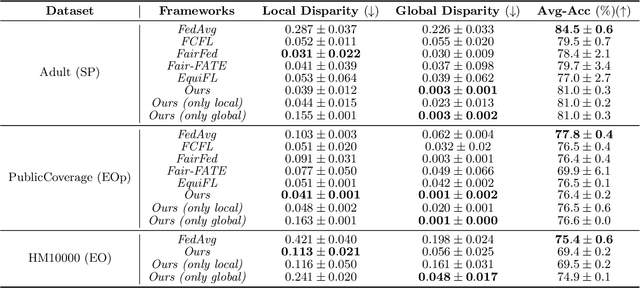Yuying Duan
Patient-Conditioned Adaptive Offsets for Reliable Diagnosis across Subgroups
Jan 19, 2026Abstract:AI models for medical diagnosis often exhibit uneven performance across patient populations due to heterogeneity in disease prevalence, imaging appearance, and clinical risk profiles. Existing algorithmic fairness approaches typically seek to reduce such disparities by suppressing sensitive attributes. However, in medical settings these attributes often carry essential diagnostic information, and removing them can degrade accuracy and reliability, particularly in high-stakes applications. In contrast, clinical decision making explicitly incorporates patient context when interpreting diagnostic evidence, suggesting a different design direction for subgroup-aware models. In this paper, we introduce HyperAdapt, a patient-conditioned adaptation framework that improves subgroup reliability while maintaining a shared diagnostic model. Clinically relevant attributes such as age and sex are encoded into a compact embedding and used to condition a hypernetwork-style module, which generates small residual modulation parameters for selected layers of a shared backbone. This design preserves the general medical knowledge learned by the backbone while enabling targeted adjustments that reflect patient-specific variability. To ensure efficiency and robustness, adaptations are constrained through low-rank and bottlenecked parameterizations, limiting both model complexity and computational overhead. Experiments across multiple public medical imaging benchmarks demonstrate that the proposed approach consistently improves subgroup-level performance without sacrificing overall accuracy. On the PAD-UFES-20 dataset, our method outperforms the strongest competing baseline by 4.1% in recall and 4.4% in F1 score, with larger gains observed for underrepresented patient populations.
The Cost of Local and Global Fairness in Federated Learning
Mar 27, 2025



Abstract:With the emerging application of Federated Learning (FL) in finance, hiring and healthcare, FL models are regulated to be fair, preventing disparities with respect to legally protected attributes such as race or gender. Two concepts of fairness are important in FL: global and local fairness. Global fairness addresses the disparity across the entire population and local fairness is concerned with the disparity within each client. Prior fair FL frameworks have improved either global or local fairness without considering both. Furthermore, while the majority of studies on fair FL focuses on binary settings, many real-world applications are multi-class problems. This paper proposes a framework that investigates the minimum accuracy lost for enforcing a specified level of global and local fairness in multi-class FL settings. Our framework leads to a simple post-processing algorithm that derives fair outcome predictors from the Bayesian optimal score functions. Experimental results show that our algorithm outperforms the current state of the art (SOTA) with regard to the accuracy-fairness tradoffs, computational and communication costs. Codes are available at: https://github.com/papersubmission678/The-cost-of-local-and-global-fairness-in-FL .
Post-Fair Federated Learning: Achieving Group and Community Fairness in Federated Learning via Post-processing
May 28, 2024



Abstract:Federated Learning (FL) is a distributed machine learning framework in which a set of local communities collaboratively learn a shared global model while retaining all training data locally within each community. Two notions of fairness have recently emerged as important issues for federated learning: group fairness and community fairness. Group fairness requires that a model's decisions do not favor any particular group based on a set of legally protected attributes such as race or gender. Community fairness requires that global models exhibit similar levels of performance (accuracy) across all collaborating communities. Both fairness concepts can coexist within an FL framework, but the existing literature has focused on either one concept or the other. This paper proposes and analyzes a post-processing fair federated learning (FFL) framework called post-FFL. Post-FFL uses a linear program to simultaneously enforce group and community fairness while maximizing the utility of the global model. Because Post-FFL is a post-processing approach, it can be used with existing FL training pipelines whose convergence properties are well understood. This paper uses post-FFL on real-world datasets to mimic how hospital networks, for example, use federated learning to deliver community health care. Theoretical results bound the accuracy lost when post-FFL enforces both notion of fairness. Experimental results illustrate that post-FFL simultaneously improves both group and community fairness in FL. Moreover, post-FFL outperforms the existing in-processing fair federated learning in terms of improving both notions of fairness, communication efficiency and computation cost.
 Add to Chrome
Add to Chrome Add to Firefox
Add to Firefox Add to Edge
Add to Edge